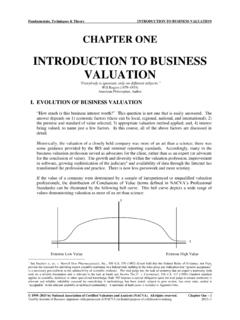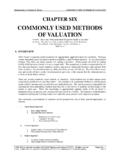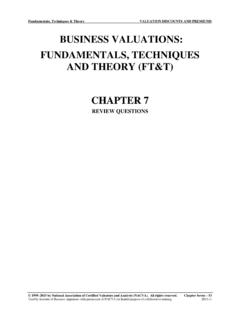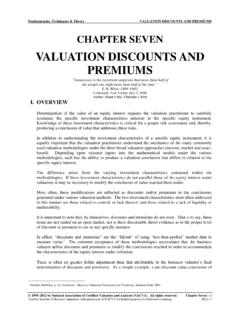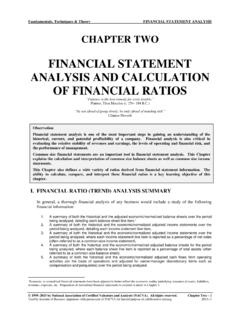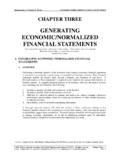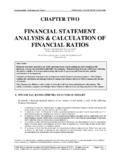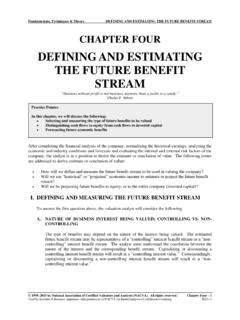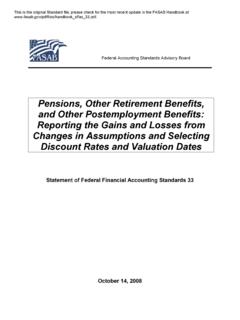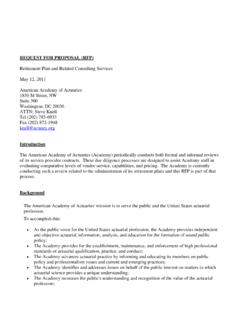Transcription of DEFINING THE VALUATION ENGAGEMENT AND …
1 Fundamentals, Techniques & Theory VALUATION ENGAGEMENT & OBTAINING INFORMATION 1995 2015 by National Association of Certified Valuators and Analysts (NACVA). All rights reserved. Chapter Nine 1 Used by Institute of Business Appraisers with permission of NACVA for limited purpose of collaborative training. CHAPTER NINE DEFINING THE VALUATION ENGAGEMENT AND OBTAINING THE NECESSARY INFORMATION I. DEFINING THE VALUATION ENGAGEMENT DEFINING the VALUATION ENGAGEMENT is the initial step in laying the foundation for the ENGAGEMENT . By considering the following items, the analyst can establish the necessary parameters for DEFINING the ENGAGEMENT . A. ENGAGEMENT ACCEPTANCE The first and probably most critical issue a VALUATION Analyst must address is whether or not to accept the VALUATION ENGAGEMENT .
2 In evaluating whether or not to accept a VALUATION ENGAGEMENT , the analyst must consider any real or presumed conflicts of interest that would preclude the analyst from accepting the ENGAGEMENT . This is especially important for CPA members of the AICPA, considering the aspects of changes to the Professional Ethics Division Interpretations and Independence would be impaired if a member performs an appraisal, VALUATION , or actuarial service where the results of the service, individually or in the aggregate, would be material to the financial statements and the appraisal, VALUATION , or actuarial service involves a significant degree of subjectivity. Preparing an actuarial VALUATION of a client s pension or post-employment benefit plan liabilities generally does not require a significant degree of subjectivity because this service is based on a single prescribed methodology that produces reasonably consistent results.
3 Therefore, such services would not impair independence provided all significant assumptions and matters of judgment are determined or approved by the client and the client is in a position to have an informed judgment on, and accepts responsibility for, the results of the service. Valuations performed in connection with, for example, business combinations or appraisals of assets generally are not based on a single methodology and, therefore, the results can vary widely. Accordingly, if these services produce results that are material to the financial statements, independence would be impaired. Appraisal, 1 New interpretations No. 101-03 to Rule 101 effective for new services after October 1, 2003 and services in existence at December 31, 2003 do not impair independence if completed by December 31, 2004, , VALUATION ENGAGEMENT AND OBTAINING INFORMATION Fundamentals, Techniques & Theory 2 Chapter Nine 1995 2015 by National Association of Certified Valuators and Analysts (NACVA).
4 All rights reserved. Used by Institute of Business Appraisers with permission of NACVA for limited purpose of collaborative training. VALUATION , and actuarial services performed for non-financial statement purposes would not impair independence. In deciding whether or not to accept a VALUATION ENGAGEMENT for a client with whom you are already involved, ask yourself some questions. Your answers will tell you if you can accept the ENGAGEMENT or whether you must recommend another certified member for the task. 1. Will this VALUATION be material individually or in the aggregate to the financial statements of my client? If the answer is yes, a conflict exists. VALUATION requires some degree of subjectivity, and the ENGAGEMENT should be declined.
5 Independence and objectivity would be deemed impaired if the results of this ENGAGEMENT would be material to the financial statements and the VALUATION would involve a significant degree of subjectivity. A VALUATION performed for the combining of two companies would significantly affect their financial statements, and would be considered an ethical impairment for the CPA and not an objective ENGAGEMENT for most other VALUATION analysts. 2. Is there more than one method of VALUATION which I could or would use? A VALUATION performed which uses more than one method, or a combination of methods, or a weighting of methods, or an averaging of methods or for which there is not one universally accepted method to use is subjective by nature.
6 The analyst could argue the meaning of significant degree in the definition above. An actuarial VALUATION , wherein a single prescribed methodology produces reasonably consistent results no matter who does the work, could be argued to be an insignificant issue, and therefore allowed. Business VALUATION by its nature requires some subjectivity, and if the VALUATION impacts the financial statement of the client, it involves an ethical dilemma, and must be declined. 3. What is the purpose of this ENGAGEMENT ? Valuations performed for tax planning, tax compliance, estate planning and/or gifting, or for a divorce are not usually considered material to the financial statements of the client and should not cause a VALUATION bias.
7 Generally, accepting this kind of ENGAGEMENT all other issues being equal is ethically acceptable. 4. In a litigation situation, will I be viewed as biased because I have done work for this client? In litigation, objectivity is very important. Remember, lawyers are advocates for their client, and often expect the VALUATION analyst to be on their side. This creates a conflict and an ethical dilemma. A valuer s conclusion of value is to be independent and objective. If your VALUATION opinion must be tailored to fit into a specific set of parameters for the case, you should probably decline the ENGAGEMENT and refer. Do not be a hired gun. 5. I am a CPA and I audit this client s business. In a large firm, it is possible the auditing is done by another division or another partner.
8 Although that fact would probably mean your conclusion of value could be independent, chances are your objectivity would be deemed impaired. Decline the ENGAGEMENT except if performed for one of the non-financial reasons: tax, gifting, or divorce. Or, if feasible, withdraw yourself and your company completely from the audit, and document your reasons for withdrawing. 6. Is there some monetary gain beyond the VALUATION fee I stand to gain if I come out with the right value? Or - not gain if I come up with the wrong value? A monetary gain, other than the fee charged, creates an ethics issue and would be an impairment. Fundamentals, Techniques & Theory VALUATION ENGAGEMENT & OBTAINING INFORMATION 1995 2015 by National Association of Certified Valuators and Analysts (NACVA).
9 All rights reserved. Chapter Nine 3 Used by Institute of Business Appraisers with permission of NACVA for limited purpose of collaborative training. 7. Could I lose this client if he/she did not like my conclusion of value? If yes, what affect does the loss have on my practice? In a marital dissolution, both the moneyed and un-moneyed spouse can be unhappy with the outcome. Will you be blamed and lose the client? This is not an ethical issue but a practical issue. Its answer is important to your business. 8. I am a CPA and VALUATION is a non-attest service I would do for my client. Does my client have the competence and technical skills to meet the prerequisites required to perform any of these services themselves and therefore manage my service in this area?
10 Generally speaking, the answer is going to be no, or they likely would not ask you to do the VALUATION . If the VALUATION will require assumptions (especially financial ones) to be made by the client which they do not have the skill to do, your should refer the VALUATION work, so that you may provide your client with the management advice so they can make reasoned decisions in support of the VALUATION . 9. Can I do the VALUATION and withdraw myself (and my company) from the audit? If you cannot or do not wish to withdraw from an audit, then refer the VALUATION . The accounting and financial profession s foundation is objectivity and independence. Whether or not one is a CPA, if the answers to the questions posed above, or others germane to your practice that you think of yourself, are such that you believe your objectivity and independence may be compromised, do not accept the ENGAGEMENT .
